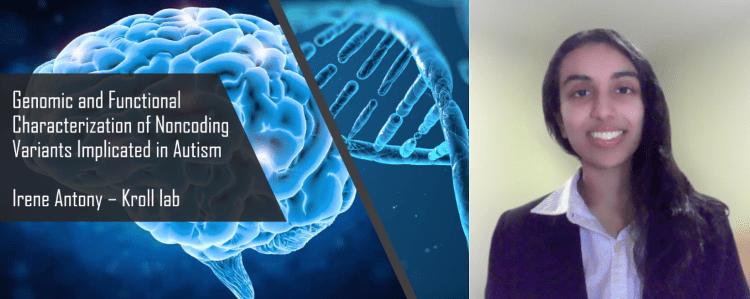Irene Antony, a neuroscience major in the School of Arts & Sciences at Washington University in St. Louis, won the Trainee Professional Development Award (TPDA) from the Society for Neuroscience (SfN).
The TPDA is awarded from a common pool of undergraduates, graduate students, and postdoctoral fellows who demonstrate scientific merit and excellence in research. Recipients participated in the Neuroscience 2021 conference, where they presented abstracts and networked with other scientists. The aim of these awards is to promote the advancement of career training for neuroscientists from a wide range of institutions. SfN seeks to promote gender equality and increase diversity in all forms throughout its programs.
Q: Where are you from originally? What brought you to Wash U?
A: I was born and raised on Long Island, New York. I fell in love with the WashU community and the opportunities here. I’m interested in becoming a physician-scientist and realized WashU would be a great place for me to explore both science and medicine. The mentors I have here are incredible; they are a team who helped me explore my interests and encouraged me to ask my own questions about both the area of science I’m interested in and my future options as a physician.
I’m interested in autism and helping patients who have neurodevelopmental disorders. When I think about how deeply I’ve been able to delve into the research side of things, specifically in the genetics that underlie autism, as well as on the clinical side where I shadow physicians at the Child and Adolescent Psychiatry Clinic, I am very grateful for my experiences at WashU.
Q: Who are your mentors?
My research mentor is Dr. Kristen Kroll. She is in the Departments of Neuroscience and Developmental Biology at the School of Medicine, and is an incredible inspiration as a woman in STEM. She always encourages me and gives me the confidence and independence to take the lead on multiple projects and scientific publications. I self-learned bioinformatics during the pandemic to explore new research areas, and now, that type of research is what I’m presenting at SfN.
One of my other mentors is Dr. Jim Skeath, who runs the MARC U-STAR program here at WashU and wrote my recommendation letter for the TPDA. This program is for students who come from underrepresented backgrounds in the sciences or disadvantaged backgrounds to encourage pursuit of STEM careers. Many students end up pursuing PhD or MD degrees, due to support from the program itself. Dr. Skeath has been inspiring and instrumental in helping me with my scientific communication, and encouraging my growth as a scientist in learning how to think critically about the questions that I ask.
My clinical mentor is Dr. John Constantino, who is the Director of the Intellectual Developmental Disabilities Research Center (IDDRC) at WashU. He has been an amazing mentor, and I continue to shadow him in his clinic and work with him on IDDRC projects like the Brain-Gene Registry, where we recruit patients and look at their gene sequencing to see if we can identify variants that are potentially pathogenic. Having both Drs. Kroll and Constantino as mentors allowed me to see the research and clinical sides of this field, and these experiences have shaped the career that I want to pursue.
In addition, I would love to thank Dr. Paul Stein, my Physiological Control Systems professor, and Diana José-Edwards, Director of the Post-Baccalaureate Premedical Program & Coordinator of STEM Diversity Initiatives, both members of the Society, for sponsoring my SfN membership and for their support throughout this process.
